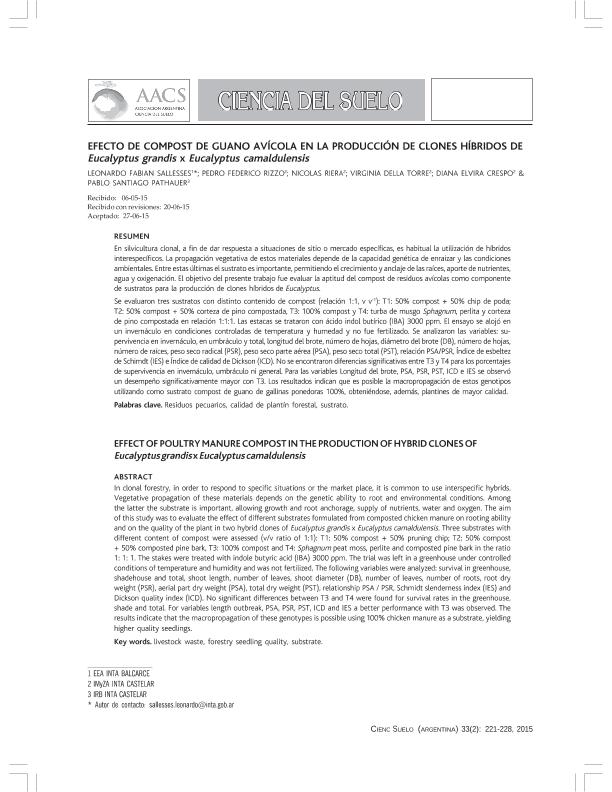Artículo
En silvicultura clonal, a fin de dar respuesta a situaciones de sitio o mercado específicas, es habitual la utilización de híbridos interespecíficos. La propagación vegetativa de estos materiales depende de la capacidad genética de enraizar y las condiciones ambientales. Entre estas últimas el sustrato es importante, permitiendo el crecimiento y anclaje de las raíces, aporte de nutrientes, agua y oxigenación. El objetivo del presente trabajo fue evaluar la aptitud del compost de residuos avícolas como componente de sustratos para la producción de clones híbridos de Eucalyptus. Se evaluaron tres sustratos con distinto contenido de compost (relación 1:1, v v-1): T1: 50% compost + 50% chip de poda; T2: 50% compost + 50% corteza de pino compostada, T3: 100% compost y T4: turba de musgo Sphagnum, perlita y corteza de pino compostada en relación 1:1:1. Las estacas se trataron con ácido indol butírico (IBA) 3000 ppm. El ensayo se alojó en un invernáculo en condiciones controladas de temperatura y humedad y no fue fertilizado. Se analizaron las variables: supervivencia en invernáculo, en umbráculo y total, longitud del brote, número de hojas, diámetro del brote (DB), número de hojas, número de raíces, peso seco radical (PSR), peso seco parte aérea (PSA), peso seco total (PST), relación PSA/PSR, Índice de esbeltez de Schimdt (IES) e Índice de calidad de Dickson (ICD). No se encontraron diferencias significativas entre T3 y T4 para los porcentajes de supervivencia en invernáculo, umbráculo ni general. Para las variables Longitud del brote, PSA, PSR, PST, ICD e IES se observó un desempeño significativamente mayor con T3. Los resultados indican que es posible la macropropagación de estos genotipos utilizando como sustrato compost de guano de gallinas ponedoras 100%, obteniéndose, además, plantines de mayor calidad. In clonal forestry, in order to respond to specific situations or the market place, it is common to use interspecific hybrids. Vegetative propagation of these materials depends on the genetic ability to root and environmental conditions. Among the latter the substrate is important, allowing growth and root anchorage, supply of nutrients, water and oxygen. The aim of this study was to evaluate the effect of different substrates formulated from composted chicken manure on rooting ability and on the quality of the plant in two hybrid clones of Eucalyptus grandis x Eucalyptus camaldulensis. Three substrates with different content of compost were assessed (v/v ratio of 1:1): T1: 50% compost + 50% pruning chip; T2: 50% compost + 50% composted pine bark, T3: 100% compost and T4: Sphagnum peat moss, perlite and composted pine bark in the ratio 1: 1: 1. The stakes were treated with indole butyric acid (IBA) 3000 ppm. The trial was left in a greenhouse under controlled conditions of temperature and humidity and was not fertilized. The following variables were analyzed: survival in greenhouse, shadehouse and total, shoot length, number of leaves, shoot diameter (DB), number of leaves, number of roots, root dry weight (PSR), aerial part dry weight (PSA), total dry weight (PST), relationship PSA / PSR, Schmidt slenderness index (IES) and Dickson quality index (ICD). No significant differences between T3 and T4 were found for survival rates in the greenhouse, shade and total. For variables length outbreak, PSA, PSR, PST, ICD and IES a better performance with T3 was observed. The results indicate that the macropropagation of these genotypes is possible using 100% chicken manure as a substrate, yielding higher quality seedlings.
Efecto de compost de guano avícola en la producción de clones híbridos de Eucalyptus Grandis x Eucalyptus Camaldulensis
Sallesses, Leonardo Fabián; Rizzo, Pedro Federico; Riera, Nicolas; Della Torre, Virginia; Crespo, Diana ; Pathauer, Pablo Santiago
; Pathauer, Pablo Santiago
 ; Pathauer, Pablo Santiago
; Pathauer, Pablo Santiago
Fecha de publicación:
06/2015
Editorial:
Asociación Argentina de la Ciencia del Suelo
Revista:
Ciencia del Suelo
ISSN:
0326-3169
Idioma:
Español
Tipo de recurso:
Artículo publicado
Clasificación temática:
Resumen
Palabras clave:
Residuos Pecuarios
,
Calidad Plantín Forestal
,
Sustrato
Archivos asociados
Licencia
Identificadores
Colecciones
Articulos(SEDE CENTRAL)
Articulos de SEDE CENTRAL
Articulos de SEDE CENTRAL
Citación
Sallesses, Leonardo Fabián; Rizzo, Pedro Federico; Riera, Nicolas; Della Torre, Virginia; Crespo, Diana; et al.; Efecto de compost de guano avícola en la producción de clones híbridos de Eucalyptus Grandis x Eucalyptus Camaldulensis; Asociación Argentina de la Ciencia del Suelo; Ciencia del Suelo; 33; 2; 6-2015; 221-228
Compartir



